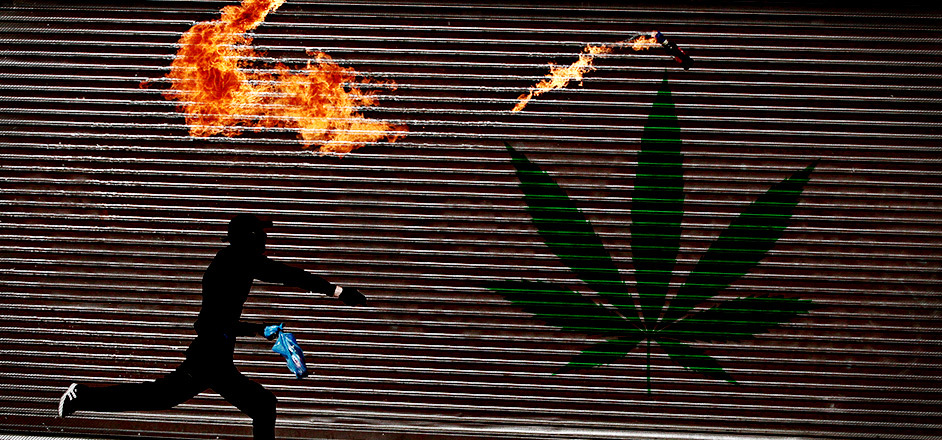It’s never good news when peaceful protests turn into violent riots. The anger and frustration of a protest crowd is like a powder keg, and all it takes is a spark in the right place to set it off — a thrown rock, a tear gas canister, a broken window. Then, all hell breaks loose. And once the energy of a crowd has shifted like that, there’s no going back or calming down.
That’s exactly what’s been happening all over the country since last Friday. Peaceful protests, provoked by battle-ready police officers, agent provocateurs and unaffiliated anarchists, turned violent; gas canisters started flying, dumpsters were set alight, bricks and stones started going through windows, and mass-looting ravaged cities like Minneapolis, New York, Chicago and Boston.
And, on the West Coast, one of the biggest targets for looters quickly became cannabis businesses — in places like Portland, Oakland, and, of course, Los Angeles.
Things in LA turned exceptionally nasty for cannabis businesses over the weekend — particularly for those on Melrose Avenue (where storefronts display chic-product in huge street-facing windows). While police were tied up elsewhere (likely beating and arresting protestors), both opportunistic looters and professional buglers took their chance to ransack one dispensary after the next.
At least several dozen cannabis businesses, in LA alone, were looted over the weekend. And for an industry that is still largely cash based, in a business which must keep a lot of product on site at all times, that sounds more like a death knell for these small dispensaries, than any kind of justice for George Floyd.
#Medmen Dispensary pic.twitter.com/azh79cdUyV
— ABRACADABS (@AbraCaDabsFest) May 31, 2020
“Most of those dispensaries were pretty much destroyed,” says Camille Roistacher, the CEO and co-founder of Voyage Distribution. She says that, not only did looters steal off with all of the product in the stores, but they smashed windows, shattered glass display cases and in many cases covered the walls with graffiti.
“[Those businesses] were hit pretty bad and unfortunately, it has forced them to close,” Roistacher says.
That is a major bummer. And not just for all the people who can’t buy weed there anymore, but, of course, for the owners of those businesses. As Roistacher explains, the dispensaries on Melrose Ave. rely heavily on foot-traffic to sell their product — without tourists coming to shop at all the stores on Melrose, they haven’t had much of a customer base since before late January.
“They saw a dip in sales [because of the COVID-19 pandemic], versus many other stores that don’t rely so much on tourism,” explains Roistacher. “To be hit with that and then to have your store pretty much destroyed… It's just got to be disheartening.”
Roistacher’s business, Voyage Distribution is a logistics company that offers “supply chain solutions to cultivators, manufacturers, distributors and retailers” according to their website. They source cannabis, provide secure transportation, storage, lab testing facilitation, packaging, labeling, sales and marketing.
Essentially, they are a middle-man between a lot of different arms of the cannabis industry. So, they’re seeing first-hand how all of this has rattled the entire cannabis supply-chain. Roistacher explains that they had a lot of new brands with orders pending from the stores that were shut down.
“Now, those orders now are all in limbo,” she says.
This kind of destruction does nothing for the cause. It does nothing to avenge or do justice for the murder of George Floyd. It only provides ammunition for those who stand to defend murderous police officers like Chauvin, or hashtags like #alllivesmatter. It only justifies their biases and solidifies their resolve that they’re on the “right side.”
They aren’t. Justice needs to be done, the system needs an overhaul and systemic racism needs to be addressed.
But that’s not going to happen by looting and ransacking small businesses who just want to get people high. That’s only going to happen by holding individuals accountable for their actions, instead of judging the many for the conduct of the few.
That goes for the protestors, the rioters and perhaps most of all, the police.




Leave a Reply